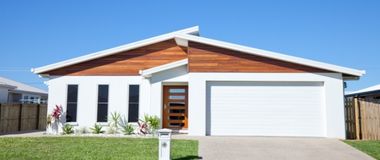The pros and cons of buying commercial property

First published 25 February 2025
Investing in commercial property can be a lucrative venture, but it also comes with its fair share of challenges. Whether you're an experienced real estate investor or just starting out, understanding the pros and cons of buying commercial property is essential for making informed decisions.
Many investors are drawn to commercial real estate because of its potential for high returns, long-term stability, and tax benefits. However, it also requires a significant upfront investment, active management, and the ability to navigate market fluctuations.
In this article, we’ll explore the benefits of buying commercial property, as well as the challenges, to help you determine whether this type of investment aligns with your financial goals.
What is commercial property?
Before diving into the pros and cons of buying commercial property, it’s important to define what qualifies as commercial real estate.
Commercial properties are those used for business purposes rather than residential living. These properties can include:
- Office buildings - From small single-tenant offices to large corporate skyscrapers
- Retail spaces - Shopping centres and standalone storefronts
- Industrial properties - Warehouses, distribution centres, and manufacturing facilities
- Specialty properties - Hotels, medical buildings, and mixed-use developments
Each type of commercial property comes with its own risks and rewards, and understanding these differences is key to making an informed investment decision.
Benefits of buying commercial property
Many investors choose commercial real estate for its potential to generate high returns and long-term stability. Below are the key benefits of buying commercial property:
1. Higher income potential
One of the biggest advantages of investing in commercial property is the potential for higher rental income compared to residential properties.
- Higher returns - Commercial real estate typically generates an annual return of 6% to 12% of the purchase price, compared to 1% to 4% for residential properties
- Multiple tenants - A commercial property with multiple tenants (such as a shopping centre) can provide multiple income streams, reducing the impact of a single vacancy
This makes commercial property particularly attractive for investors looking to maximise their cash flow.
2. Long-term financial stability
Unlike residential leases, which typically last six to twelve months, commercial property leases are often longer-term, ranging from three to ten years.
- Steady cash flow - Long-term leases provide predictable rental income and reduce the risk of frequent tenant turnover.
- Triple Net Leases (NNN) - In some cases, tenants are responsible for property expenses such as maintenance, insurance, and taxes, reducing costs for the owner
A stable lease agreement can make commercial real estate a low-risk investment for long-term financial growth.
3. Professional tenant relationships
When renting out residential properties, landlords often deal with individual tenants, which can be unpredictable. In contrast, commercial properties are leased to businesses, which:
- Are more likely to maintain the property due to the impact on their brand and operations
- Tend to pay rent consistently, especially established businesses
- Are more likely to sign long-term leases, securing long-term income
This professional dynamic makes managing commercial tenants more predictable and structured compared to residential leases.
4. Property appreciation and equity growth
Over time, commercial properties tend to increase in value, particularly in high-demand areas. Factors contributing to appreciation include:
- Inflation and demand - Commercial rents typically rise over time, increasing property value
- Location improvements - As surrounding areas develop, commercial property values increase
- Upgrades and renovations - Improving the property can enhance value and attract premium tenants
Investors who choose properties in high-growth areas can build significant long-term wealth through appreciation.
5. Tax benefits and depreciation
Another major advantage of commercial real estate investment is the ability to claim tax deductions, including:
- Depreciation - Investors can claim a tax deduction for the natural wear and tear that occurs to the building and its assets over time
- Mortgage interest deductions - Interest payments on commercial loans are tax-deductible
- Operating expenses - Costs related to property management, rates, insurance, maintenance, and repairs are deductible
These tax advantages can significantly enhance an investor’s net return over time.
6. Diversification of investment portfolio
Commercial real estate provides portfolio diversification, helping investors reduce overall risk. Because commercial properties do not always move in tandem with the stock market, they can act as a hedge against economic downturns.
By adding real estate to an investment portfolio, investors can create a balanced strategy that minimises risk while maximising long-term returns.
Challenges of buying commercial property
While commercial real estate has many advantages, there are also significant challenges investors should consider.
1. High initial investment
One of the biggest barriers to entry in commercial real estate is the high cost of acquisition.
- Financing challenges - Securing a commercial loan can be more difficult than obtaining a residential mortgage
- Larger deposit required - Commercial property loans often require 20 to 40 per cent – or even higher – as a deposit
- Upfront costs - Investors must budget for legal fees, property inspections, and renovations
Due to these high costs, commercial real estate is not always accessible to small investors.
2. Complex property management
Managing commercial properties requires more effort compared to residential rentals. Investors must be prepared to:
- Handle multiple tenants with different needs and lease agreements
- Manage regular maintenance and repairs, which may be more complex for large properties
- Comply with zoning laws and regulations, which can impact property use
Many commercial property owners hire professional property managers, which can cut into profits.
3. Market volatility and economic downturns
Commercial real estate is sensitive to economic cycles. During downturns:
- Businesses may downsize or close, leading to vacancies
- Demand for office and retail space may decline, reducing rental rates
- Interest rates may rise, increasing borrowing costs
To mitigate these risks, investors should conduct market research and choose properties in high-demand areas.
4. Vacancy risks
Unlike residential properties, where units are usually occupied quickly, commercial properties can remain vacant for long periods if a tenant leaves.
- Finding new tenants - It may take months or even years to lease out a commercial space
- Loss of rental income - A prolonged vacancy can significantly impact cash flow
- High marketing costs - Owners may need to spend more on marketing to attract tenants
Investors should have a financial cushion to cover expenses during vacancy periods.
5. Regulatory challenges and legal complexities
Commercial real estate investors must navigate complex regulations, including:
- Zoning laws - Restrictions on how the property can be used
- Building codes - Compliance with safety and environmental regulations
- Lease agreements - Negotiating legally binding contracts with tenants
Hiring legal and financial experts can help investors avoid potential legal pitfalls.
The bottom line
Is commercial property a good investment?
Commercial property investment offers numerous benefits, including higher income potential, long-term stability, and tax advantages. However, it also presents challenges, such as high upfront costs, complex management, and market risks.
For investors willing to conduct thorough research, manage risks, think long-term and weigh up the pros and cons of buying commercial property it can be a highly profitable and rewarding investment.
If you’re considering the benefits of buying commercial property, speak with a financial adviser or real estate professional to ensure you make a well-informed decision.
Would you like to explore potential commercial investment opportunities? Call us today on 1300 728 726 to learn how BMT can assist with commercial property tax depreciation or to Request a Quote
Connect with us
Stay up to date
Subscribe to receive the latest
BMT news and announcements.





